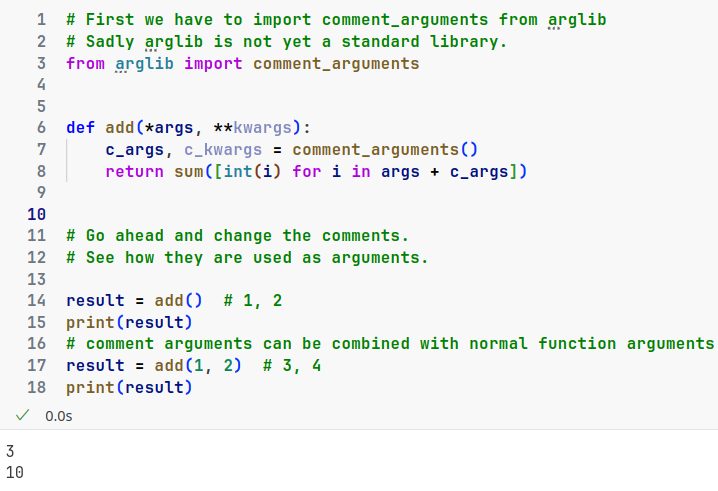Python allows programmers to pass additional arguments to functions via comments.
Now armed with this knowledge head out and spread it to all code bases.
Feel free to use the code I wrote in your projects.
Link to the source code: https://github.com/raldone01/python_lessons_py/blob/v2.0.0/lesson_0_comments.ipynb
Image transcription:
# First we have to import comment_arguments from arglib
# Sadly arglib is not yet a standard library.
from arglib import comment_arguments
def add(*args, **kwargs):
c_args, c_kwargs = comment_arguments()
return sum([int(i) for i in args + c_args])
# Go ahead and change the comments.
# See how they are used as arguments.
result = add() # 1, 2
print(result)
# comment arguments can be combined with normal function arguments
result = add(1, 2) # 3, 4
print(result)
Output:
3
10
This is version v2.0.0 of the post: https://github.com/raldone01/python_lessons_py/tree/v2.0.0
Note:
v1.0.0 of the post can be found here: https://github.com/raldone01/python_lessons_py/tree/v1.0.0
Choosing lib as the name for my module was a bit devious.
I did it because I thought if I am creating something cursed why not go all the way?
Regarding misinformation:
I thought simply posting this in programmer humor was enough.
Anyways, the techniques shown here are not yet regarded best practice.
Decide carefully if you want to apply the shown concepts in your own code bases.

IMO comments should never ever be parsed under any circumstances but I probably don't know enough to really speak on this
Seen in a code review (paraphrased):
"Why does this break when you add comments in the middle?"
Why would python even expose the current line number? What’s it useful for?
You underestimate the power of us, print debuggers.